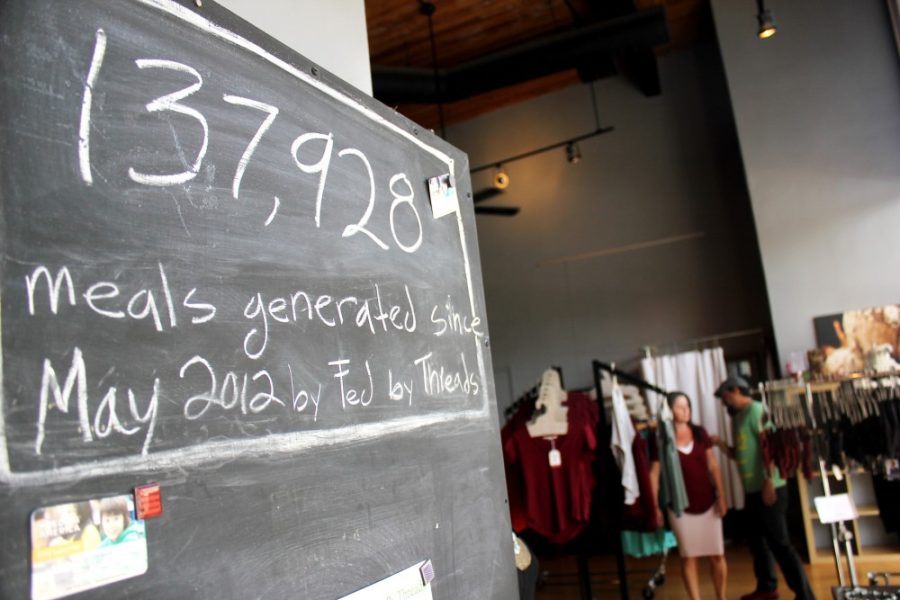Since Fed By Threads launched in 2012, its clothing sales have provided 137,928 meals to hungry people throughout the U.S. From a small clothing rack in their yoga and dance studio, founders Alok Appadurai and Jade Beall have transformed their vision into a full-fledged business complete with big plans for the future. On May 17, Fed By Threads will host the grand opening of its new store downtown on Congress Street.
Besides offering the latest fashions to flatter every body type, Fed By Threads has set out to be transparent about where it gets its materials. The store is also reducing its carbon footprint and providing food for the hungry — one garment at a time.
For every piece of clothing sold, Fed By Threads feeds 12 hungry people. Four meals are provided locally through the Community Food Bank of Southern Arizona and eight come from Feeding America, a nationwide network of food banks based out of Chicago.
Fed By Threads also creates clothing with sustainable fabrics and job opportunities in the U.S. garment manufacturing industry.
“Fed By Threads is determined to provide people a sense of transparency into what they are buying,” Appadurai said. “We want to offer a completely different outlook on how their dollar can be spent.”
Most stores today offer a variety of styles for cheap, which makes for fast shopping. Many people enjoy sporting the most recent fashions on a budget, but they may be unaware how the product was made or what environmental footprint the clothes left on their way to the racks.
“We like being able to show people that our fabrics were grown here, spun into yarn there and knit into fabric here,” Appadurai said. “No other store in Tucson offers this.”
Fed By Thread’s clothing line is all-American organic seed to fabric clothing, meaning production happens completely within the U.S. and is all organic, with no GMO or pesticides present in the clothing. By making products within the country, the store contributes to “re-shoring” the job market in the U.S.
“It’s not about being in the business for money,” said Manish Shah, owner of Maya Tea Company and a devout supporter of Fed By Threads.
“We will get there by being in the business for a bigger cause.”
Through providing this knowledge to customers, Fed By Threads hopes that people will begin to question other stores about where their products came from and how they were made.
“We want to see consumers ask questions,” Appadurai said. “If these clothing companies cannot provide the answers, customers may lose interest, and this is what sparks a change in business.”
The store’s current location is at Third Avenue and Ninth Street, so the new location on a busy street like Congress will provide more opportunities to show customers how seemingly simple choices can have truly profound results. However, Appadurai and Beall’s dreams don’t stop at Congress Street. On their long-term goal list: Go national.
“I think if American Apparel and Toms Shoes can go national, so can we,” Beall said.
Though the grand opening is on Congress Street, the owners of Fed By Threads also hope to raise more awareness about their philosophy among UA students. The new store will also accept CatCash.
“We don’t want people believing they need to look like models to wear something fashionable,” Appadurai said. “We want the young generation to know that their purchase decisions are very loud and people are listening.”
@KiaGardner









